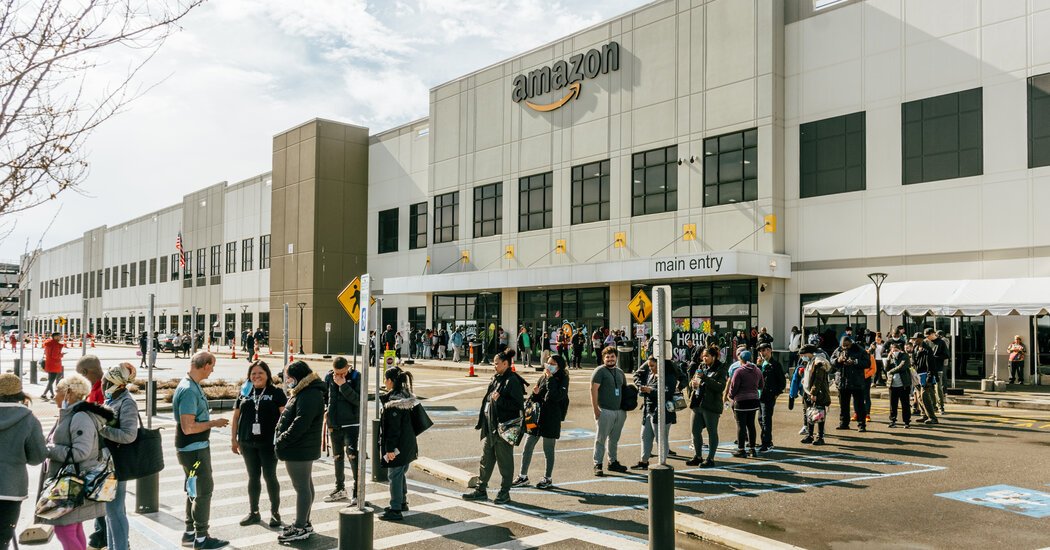After years of organizing Amazon workers and pressuring the company to bargain over wages and working conditions, two prominent unions are teaming up to challenge the online retailer.
The partnership was made final in voting that ended on Monday after members of the Amazon Labor Union, the only union formally representing Amazon warehouse workers in the United States, voted overwhelmingly to affiliate with the 1.3-million-member International Brotherhood of Teamsters. The vote was overseen by the Amazon union.
The A.L.U. scored a surprise victory in an election at a Staten Island warehouse in 2022. But it has yet to begin bargaining with Amazon, which continues to contest the election outcome. Leaders of both unions said the affiliation agreement would put them in a better position to challenge Amazon and would provide the A.L.U. with more money and staff support.
“The Teamsters and A.L.U. will fight fearlessly to ensure Amazon workers secure the good jobs and safe working conditions they deserve in a union contract,” Sean O’Brien, the Teamsters president, said in a statement early Tuesday.
Amazon declined to comment on the affiliation.
The Teamsters are ramping up their efforts to organize Amazon workers nationwide. The union voted to create an Amazon division in 2021, and Mr. O’Brien was elected that year partly on a platform of making inroads at the company.
The Teamsters told the A.L.U. that they had allocated $8 million to support organizing at Amazon, according to Christian Smalls, the A.L.U. president, and that the larger union was prepared to tap its more than $300 million strike and defense fund to aid in the effort. The Teamsters did not comment on their budget for organizing at Amazon.
The Teamsters also recently reached an affiliation agreement with workers organizing at Amazon’s largest airplane hub in the United States, a Kentucky facility known as KCVG. Experts have said unionizing KCVG could give workers substantial leverage because Amazon relies heavily on the hub to meet its one- and two-day shipping goals.
David Levin, staff director for Teamsters for a Democratic Union, a reform group within the union that helped mobilize United Parcel Service workers during last year’s successful contract campaign, said many Teamsters members who were involved in pressuring UPS were now helping Amazon workers organize.
“Worker-leaders and activists are coming out of the UPS contract campaign and getting involved in building Amazon volunteer organizing committees,” Mr. Levin said.
Efforts to unionize Amazon over the past decade have been scattered across a variety of established unions and independent worker groups. Some experts argue that given the company’s size and longstanding opposition to unions, establishing a significant union presence there will require some consolidation of the organizing.
“We’ve had these different efforts, all these different pockets, that yielded some important breakthroughs,” said Barry Eidlin, a sociologist at McGill University in Montreal who studies labor. “But they also revealed the limitations of having a diffuse approach.”
The affiliation agreement with the Teamsters, a copy of which was shared with The New York Times, stipulates that the A.L.U. will have the exclusive right within the Teamsters to organize additional Amazon warehouse workers in New York City and promises to help the new local with organizing, research, communications and legal representation.
It also gives the A.L.U. a role in the Teamsters’ broader Amazon organizing, stating that at least three members of the local will take part in “executive planning and strategy discussions” of the Teamsters’ Amazon division, and that the local will “lend its expertise to assist in organizing other Amazon facilities” across the country.
The A.L.U. energized the labor movement with its victory in 2022, but it soon encountered major challenges. It lost a union election at a nearby warehouse on Staten Island a few weeks later and another election at a warehouse near Albany, N.Y., that fall.
The union began to fracture after the second loss, with several A.L.U. organizers raising concerns that the union’s leaders had too much power and were unaccountable to members. Mr. Smalls asserted that the union was worker-led.
An A.L.U. dissident group critical of Mr. Smalls filed a lawsuit in 2023 seeking to force leadership elections. The two sides announced a settlement in January, and elections are scheduled for the summer, to be overseen by a monitor approved by a federal court. Mr. Smalls is not a candidate, while the dissident group, the A.L.U. Democratic Reform Caucus, is fielding candidates for all four leadership positions. The slate is led by Connor Spence, an A.L.U. founder.
In the meantime, the A.L.U. has faced financial difficulties and ended last year with $33,000 in assets and $81,000 in liabilities, according to federal filings.
In May, both A.L.U. factions visited the Teamsters headquarters in Washington, where Teamsters officials pitched them on the idea of affiliating, Mr. Smalls said.
He said the Teamsters had offered to make their resources available to Amazon workers — including strike pay — while largely preserving the Amazon union’s independence. He signed the affiliation agreement in early June.
The signing surprised the reform caucus, which had told the Teamsters that A.L.U. members would need more time to deliberate. But the caucus ultimately decided to back affiliation as long as A.L.U. members ratified it, saying it would help “turn the beachhead we’ve secured in Staten Island into a militant, autonomous local.”
Mr. Spence, the reform caucus candidate for A.L.U. president, said that if his group won the leadership election on Staten Island, it would put together a plan to take on Amazon in consultation with workers and present the plan to the Teamsters in hopes of securing the necessary resources.
Amazon fired Mr. Spence last fall for what it said were violations of its policy governing off-duty access to its facilities. He is challenging the firing in a case that is before an administrative judge with the National Labor Relations Board.
Mr. Spence and another fired Amazon worker were removed by the police last week after they appeared in front of the warehouse trying to persuade workers to ratify the affiliation agreement. Officers handcuffed the two former workers, took them to a station and gave them tickets requiring a court appearance.
Lisa Levandowski, an Amazon spokeswoman, said the company had called the police because a group, mostly Teamsters, was creating a disturbance outside the warehouse and had rebuffed Amazon’s request to leave. She said that after the police arrived, all but Mr. Spence and his former co-worker had left. (Employees are allowed to distribute material outside the building during off hours.)
Mr. Spence said he had appeared in front of the building many times for organizing purposes in recent weeks without encountering the police.



